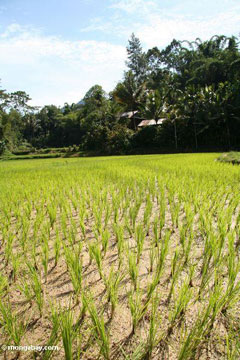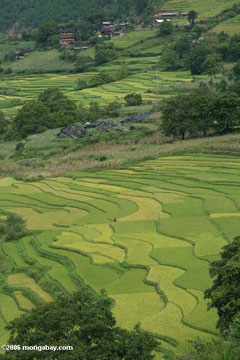Targeted payments to farmers could protect environment
Targeted payments to farmers could protect environment
mongabay.com
November 15, 2007
Targeted payments to farmers in developing countries could be an effective approach to protecting the environment and addressing climate change, states a new report from the Food and Agriculture Organization of the United Nations (FAO).
“Agriculture employs more people and uses more land and water than any other human activity,” said FAO Director-General Jacques Diouf in his foreword to the report. “It has the potential to degrade the Earth’s land, water, atmosphere and biological resources — or to enhance them — depending on the decisions made by the more than two billion people whose livelihoods depend directly on crops, livestock, fisheries or forests. Ensuring appropriate incentives for these people is essential.”
The report, titled “The State of Food and Agriculture”, says that population growth, rapid economic development, increasing demand for biofuels and climate change are stressing environmental resources. It notes that nature’s services are chronically undervalued — and often viewed as free. Consequently there is little incentive to preserve ecosystems. Further, misplaced subsidies can distort the true costs of producing goods and services.
“Current incentives tend to favour the production of food, fibre, and increasingly, biofuels, but they typically under-value other beneficial services that farmers can provide, such as carbon storage, flood control, clean water provision or biodiversity conservation,” stated FAO.

|
The report says that with the proper incentives, farmers can provide “better environmental outcomes”.
“Payments for environmental services represent one way of increasing incentives to adopt improved agricultural practices—and even to offset pollution generated in other sectors,” said FAO.
The report cites carbon offsets as an example. Conversion of forests and other ecosystems for agriculture and other uses is a major source (i.e. 15-20 percent) of anthropogenic greenhouse gas emissions. Improving cultivation methods can reduce these emissions and even turn agriculture into a carbon ‘sink’ helping mitigate human-caused climate change.
“Well-designed payments for environmental services are one way to help farmers to change land-use practices and make farming more environmentally friendly,” said Leslie Lipper, Senior Environmental Economist. “These are payments for real services farmers can provide, much like farmers are paid for the rice or coffee they produce.”
Payments for ecosystem services are rapidly evolving but to date few of these programs are focused on farmers and agricultural lands in developing countries, according to the report. It says that “careful targeting as well as measures to monitor delivery of environmental services” could facilitate better stewardship by farmers.
“If properly designed, payment programmes for environmental services might also benefit many of the more than one billion poor people in developing countries that live in fragile ecosystems,” Lipper said.
A target=_blank href=http://www.fao.org/docrep/010/a1200e/a1200e00.htm>The State of Food and Agriculture
Related
Do Costa Rica’s payments for environmental services work?
While Costa Rica is now known as a world leader for conversation policies and ecotourism, the Central American country had some of the world’s highest deforestation rates prior to establishing its reputation. Clearing for cattle pasture and agriculture destroyed much of the country’s biodiverse rainforests in the 1960s and 1970s.








